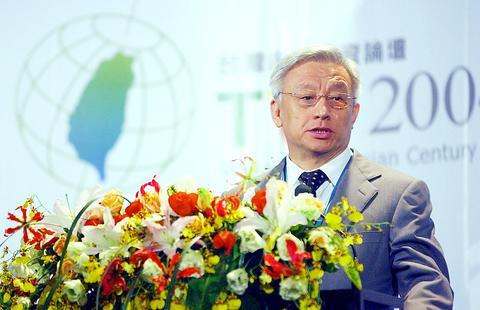United Microelectronics Corp (UMC, 聯電) Chairman Robert Tsao (曹興誠) yesterday criticized his bigger rival, Taiwan Semiconductor Manufacturing Co (TSMC, 台積電) Chairman Morris Chang (張忠謀), for the latter's recent change in attitude toward a stock bonus scheme.
In a speech delivered at the 2004 Taiwan Venture Forum yesterday, Tsao said the stock bonus scheme is a proven system that helps the nation's high-tech companies hold onto their employees.

PHOTO: CNA
But there are concerns by investors and regulators that excluding such grants as a cost allows companies to inflate their profits while hurting return on equity. Still, Tsao defended the scheme as the best solution to attain a lower employee turnover rate.
In late October, Chang said that the expenses incurred by stock bonuses do place a burden on earnings and could distort a company's bottom line. He said that TSMC was still seeking a better solution to retain talented employees and safeguard shareholders' interests.
As a result, TSMC said last week that its board was proposing a revised stock dividend policy, calling for future dividend distributions to be made preferably by way of cash.
Stock dividends won't exceed 50 percent of the total distribution, the company said in a statement.
But Tsao yesterday raised doubts about Chang's stewardship. He said that stock bonuses should be granted to rank-and-file employees instead of senior level management, but as far as he knew Chang received the majority of TSMC's dividend distribution.
"TSMC and Morris Chang are the biggest beneficiaries of the stock bonus scheme, and we believe that he should come out to defend the system. But he hasn't," Tsao said.
"After he [Chang] criticized the system ... we thought he might cancel the grants. But in contrast, he worked to issue the dividend, with himself receiving the greatest amount. Therefore, I question his credibility," Tsao said.
The new rules requiring firms to count stock bonuses as part of their costs, are expected to be implemented next year, a Chinese-language business daily reported last month, citing unidentified government officials.

TAKING STOCK: A Taiwanese cookware firm in Vietnam urged customers to assess inventory or place orders early so shipments can reach the US while tariffs are paused Taiwanese businesses in Vietnam are exploring alternatives after the White House imposed a 46 percent import duty on Vietnamese goods, following US President Donald Trump’s announcement of “reciprocal” tariffs on the US’ trading partners. Lo Shih-liang (羅世良), chairman of Brico Industry Co (裕茂工業), a Taiwanese company that manufactures cast iron cookware and stove components in Vietnam, said that more than 40 percent of his business was tied to the US market, describing the constant US policy shifts as an emotional roller coaster. “I work during the day and stay up all night watching the news. I’ve been following US news until 3am

UNCERTAINTY: Innolux activated a stringent supply chain management mechanism, as it did during the COVID-19 pandemic, to ensure optimal inventory levels for customers Flat-panel display makers AUO Corp (友達) and Innolux Corp (群創) yesterday said that about 12 to 20 percent of their display business is at risk of potential US tariffs and that they would relocate production or shipment destinations to mitigate the levies’ effects. US tariffs would have a direct impact of US$200 million on AUO’s revenue, company chairman Paul Peng (彭雙浪) told reporters on the sidelines of the Touch Taiwan trade show in Taipei yesterday. That would make up about 12 percent of the company’s overall revenue. To cope with the tariff uncertainty, AUO plans to allocate its production to manufacturing facilities in

Six years ago, LVMH’s billionaire CEO Bernard Arnault and US President Donald Trump cut the blue ribbon on a factory in rural Texas that would make designer handbags for Louis Vuitton, one of the world’s best-known luxury brands. However, since the high-profile opening, the factory has faced a host of problems limiting production, 11 former Louis Vuitton employees said. The site has consistently ranked among the worst-performing for Louis Vuitton globally, “significantly” underperforming other facilities, said three former Louis Vuitton workers and a senior industry source, who cited internal rankings shared with staff. The plant’s problems — which have not

COLLABORATION: Given Taiwan’s key position in global supply chains, the US firm is discussing strategies with local partners and clients to deal with global uncertainties Advanced Micro Devices Inc (AMD) yesterday said it is meeting with local ecosystem partners, including Taiwan Semiconductor Manufacturing Co (TSMC, 台積電), to discuss strategies, including long-term manufacturing, to navigate uncertainties such as US tariffs, as Taiwan occupies an important position in global supply chains. AMD chief executive officer Lisa Su (蘇姿丰) told reporters that Taiwan is an important part of the chip designer’s ecosystem and she is discussing with partners and customers in Taiwan to forge strong collaborations on different areas during this critical period. AMD has just become the first artificial-intelligence (AI) server chip customer of TSMC to utilize its advanced